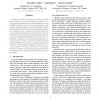Free Online Productivity Tools
i2Speak
i2Symbol
i2OCR
iTex2Img
iWeb2Print
iWeb2Shot
i2Type
iPdf2Split
iPdf2Merge
i2Bopomofo
i2Arabic
i2Style
i2Image
i2PDF
iLatex2Rtf
Sci2ools
129
click to vote
ICSE
2007
IEEE-ACM
2007
IEEE-ACM
Behaviour Model Synthesis from Properties and Scenarios
Synthesis of behaviour models from software development artifacts such as scenario-based descriptions or requirements specifications not only helps significantly reduce the effort of model construction, but also provides a bridge between approaches geared toward requirements analysis and those geared towards reasoning about system design at the architectural level. However, the models favoured by existing synthesis approaches are not sufficiently expressive to describe both universal constraints provided by requirements and existential statements provided by scenarios. In this paper, we propose a novel synthesis technique that constructs behaviour models in the form of Modal Transition Systems (MTS) from a combination of safety properties and scenarios. MTSs distinguish required, possible and proscribed behaviour, and their elaboration not only guarantees the preservation of the properties and scenarios used for synthesis but also supports further elicitation of new requirements.
Behaviour Models | ICSE 2007 | Modal Transition Systems | Software Engineering | Synthesis Approaches |
Related Content
| Added | 09 Dec 2009 |
| Updated | 09 Dec 2009 |
| Type | Conference |
| Year | 2007 |
| Where | ICSE |
| Authors | Greg Brunet, Marsha Chechik, Sebastián Uchitel |
Comments (0)

